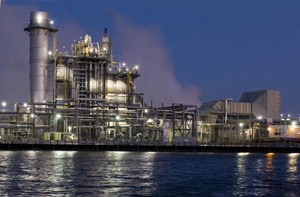ANIMA examines 10 years of foreign investment in North Africa
 At the first edition of the Hub Africa Forum on 2 and 3 April in Casablanca, ANIMA Investment Network presented its study into foreign direct investment in 5 countries.
At the first edition of the Hub Africa Forum on 2 and 3 April in Casablanca, ANIMA Investment Network presented its study into foreign direct investment in 5 countries.
The report, entitled "Foreign investment and business partnerships in North Africa (2003-2013)" was produced by the cooperation platform for economic development in the Mediterranean and drew on data collected by the ANIMA - MIPO observatory (which looked at 11 countries and identified 6,000 FDI projects). The document sets out proposals for enhanced economic integration in the North African basin. North African countries account for around half the foreign direct investment (FDI) identified by the observatory. Although in value terms 2013 marks the fourth best year of the decade with €15.9 bn (+17% compared with 2010), thanks to some large-scale projects from the Gulf in particular, the volume of FDI projects in these countries is at its lowest level since 2004 (226 projects were identified, a fall of 38% from 2010). Energy, banks, telecoms, construction, tourism, cement and chemicals are the sectors that continue to attract most investment. Morocco is best off of the countries (with €7.5 bn announced in 2013) while Tunisia is struggling (with €637 million). There has been no notable progress since 2011 for Algeria (€1.519 bn), Egypt (€4.84 bn) and Libya (€1.3 bn) where the energy sector accounts for a large proportion of the amounts announced in 2013.
While Europe accounts for 53% of the FDI projects, other regions are also involved, including the countries of the Gulf, which account for 16%.
To activate regional South-South integration in FDI, Anima has several recommendations, beginning with redirecting "investment that is currently focused on capital-intensive sectors (such as telecoms, energy, construction) towards other more directly job-creating industries. North African countries are seeing the emergence of a new generation of accelerating factors, with companies that are able to go global, take up technology and create new jobs quickly."
http://www.animaweb.org/sites/default/files/ain_anima_synthese_publique_fr.pdf
The CCIMP all set for sustainability in the Mediterranean
 The Marseille Provence Chamber of Commerce and Industry (CCIMP) has contributed to the 21st Mediterranean Conference of Parties to the United Nations Framework Convention on Climate Change (MedCop21) by organising a workshop on supporting Mediterranean businesses to follow good environmental practices. Between 2007 and 2013, it participated in a total of 13 European programmes supporting these kinds of initiatives.
The Marseille Provence Chamber of Commerce and Industry (CCIMP) has contributed to the 21st Mediterranean Conference of Parties to the United Nations Framework Convention on Climate Change (MedCop21) by organising a workshop on supporting Mediterranean businesses to follow good environmental practices. Between 2007 and 2013, it participated in a total of 13 European programmes supporting these kinds of initiatives.
‘By taking part in the Mediterranean Civil Society Forum for Climate Change, the CCIMP is working to support the Mediterranean region and sustainable economies. We are convinced that global warming solutions can turn into development and partnership opportunities for Mediterranean businesses,’ explains Paul Bichat, International Cooperation and European Project Manager at CCMIP. At MedCop 21, in partnership with the Association of the Mediterranean Chambers of Commerce and Industry (ASCAME – Association des Chambres de Commerce et d’Industrie de la Méditérranée), the CCIMP will therefore lead a ‘Focus on SMEs’ workshop entitled ‘Mediterranean businesses responding to climate change’. In its capacity as a support provider, the local chamber implements a number of measures ‘to help Mediterranean businesses anticipate future developments so that they can incorporate good environmental practices and to encourage them to develop new products and services that will support environmental protection,’ adds Paul Bichat.
As leaders and collaborators on European projects focussed on North–South cooperation, the CCIMP contributed to no less than 13 programmes between 2007 and 2013, mainly co-financed by various European institutions. These spearheaded 7 broad themes, which ranged from raising awareness among Mediterranean businesses with social and ecological concerns (Responsible Med) to more formative programmes in energy performance, waste management, eco-innovation, green technologies and eco-construction (InsMed and Score for the development of a sustainable building network in the Mediterranean). There was also competitive and sustainable tourism and even workshops aimed at helping Mediterranean businesses in the sustainable energy sector to develop innovative financial tools, etc. Around ten countries bordering the Mediterranean have been involved in at least one of these programmes.



